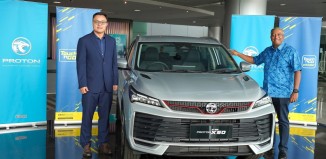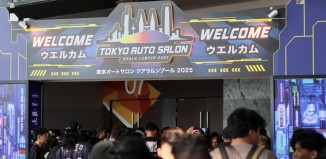Gloomy View of Proton After 2005
Over a year ago, Proton CEO Tengku Tan Sri Mahaleel confidently declared that the national carmaker is ‘ready to face the challenges of AFTA [after 2003]’, the time when tariff barriers which have given national cars a price advantage over other makes will have to be removed (at least for those products which originate from other ASEAN countries). But early this year, the Malaysian government put in a request to the regional body for an extension of the deadline to remove those barriers – from the original 2003 to 2005. The reason given was that Malaysia’s auto industry was still in recovery mode after the severe economic downturn and needed extra time to get back into competitive shape.
That Tan Sri Tengku Mahaleel was telling the world Proton was ready seemed to make a mockery of the reason given by Malaysia. “After all, isn’t Proton ‘the automotive industry’?”, asked the senior executive of a leading automobile manufacturer from Europe. If Proton’s CEO said his company was ready for AFTA, why is the government saying that the industry is ‘not ready? Sources told AUTOWORLD.COM.MY that his contradictory statement angered officials at the Ministry of International Trade & Industry who summoned a senior Proton executive for reprimanding.
In any case, it is likely that Malaysia will get the extension (it is to be officially confirmed at the ASEAN Economic Ministerial Meeting in Thailand this October) but the acceptance of Malaysia’s request comes grudgingly as members like Thailand are unhappy over the matter and even threatened reciprocal action by not allowing Malaysia’s palm oil imports on the 0% – 5% basis.
While Malaysia’s request was made under Article 6 of the AFTA Agreement signed in 1992, the other ASEAN trade ministers want to review that provision which, according to meeting chairman George Yeo (Trade Minister of Singapore), “should be invoked only when the needs are clearly over-riding”. There will have to be clearer justification for such requests in future.
Will two years make a difference for Proton? The government thinks so and speaking for Perodua, its Managing Director, Datuk Abdul Rahman Omar said that the extra two years will provide ‘some breathing space’ for the company to be better prepared for the open market.
However, F. Yoshimi, who represents Mitsubishi Motors on the Proton board of directors, is recently reported to have expressed concern that the national carmaker will not be able to compete after 2005. He believes that with a volume of 240,000 units a year, Proton lacks the economies of scale needed to achieve the low production costs necessary to compete against the other players on a regional basis. As with many analysts, he forecasts that Proton’s present 60% share of the domestic market could be halved once the tariff barriers are gone.
As long as Proton has to continue to import engines and drivetrain components from overseas – whether from Japan or France – it will continue to have higher production costs than other more established makers which also have far more efficient economies of scale. Mitsubishi, for example, produces over one million vehicles a year and with its tie-up with DaimlerChrysler, it will enjoy further benefits through sharing of resources and procurement of components.
What is also working against Proton is the even more unfavourable exchange rate with the yen since the recession caused our ringgit to depreciate. This means that the components it has to buy from Japan – and they are high-cost items like the engines and transmissions – are actually more expensive than before 1997.
If Proton’s share is slashed domestically, its only hope for the surplus output will be to export more cars. Yet there are significant changes taking place in regulations in Europe which Proton’s present range of models – apart from the yet-to-be-launched Waja – will have difficulty meeting in coming years. Proton was aware of this and developed the Waja with an ability to meet regulations over a long term. There is a possibility that re-engineering – which Proton is now quite skilled at – will upgrade some models to some extent but it won’t be an optimum long-term solution.
Predictably, Yoshimi’s pessimistic comments have angered government officials with a minister reminding him that Mitsubishi, as a partner in Proton, is expected to provide the necessary assistance to make the company competitive in future.
But Yoshimi’s comments also provide a ‘reality check’ on Proton’s future as it is clear that the future for any automaker, not just Proton, lies in being able to have economies of scale so that the cost of each unit, be it a piston or the whole car, is low. That’s the reason for the spate of mergers that has taken place in the past few years – even the biggest players know that if they don’t consolidate and get bigger volumes, they will not be competitive enough.
Both Volvo and Saab were Swedish companies of an almost similar scale to Proton and in the case of Volvo, its volume never really allowed it to grow much bigger. The only choice for survival was to be part of a larger group – Volvo going with Ford and Saab with GM – where the cost of developing a new model could be shared and common components used. Instead of buying 10,000 door handles a year, a greater 50,000 of the same item could be ordered at a far lower unit cost.
The automobile industry is all about volumes and as Perodua’s Datuk Abdul Rahman Omar pointed out, “just one month’s production at a Ford or Toyota factory is equal to a whole year’s production at Perodua!”. If they wanted to, all one of the big companies would have to do would be to dump one month’s production in Malaysia at the cheaper prices they can offer and non one would buy a Perodua.
Perhaps Proton’s future lies in being a niche manufacturer, perhaps of sportscars. After all, it has the Proton Ultimate Concept on the drawing board and this specialty sportscar could be a leading model for the company to market. It has Lotus Engineering and all that the advanced British engineering firm can offer to produce top-notch high-performance machines.
But as Tan Sri Tengku Mahaleel has also stressed, Proton is a national car company and among its missions is to provide affordable cars to Malaysians. As long as this mission remains unchanged, it will have to keep making cheap models like the Iswara available, even if the revenues from such aged models are minimal.
Four and a half years and counting…
(Readers are invited to discuss this subject in our Car Cafe forum area)

























